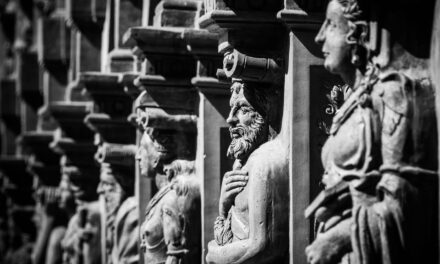The following article is adapted from Craig Biehl, Too Small: Why Atheists Can’t Know What They Say They Know. Forthcoming (Tulip Publishing, 2024.)
In the book, The Impossibility of God1Michael Martin and Ricki Monnier, eds., The Impossibility of God (Amherst: Prometheus Books, 2003)., the editors present five categories of arguments that they claim disprove God’s existence. One such claim asserts that “a contradiction between two or more of God’s attributes” renders God impossible, as follows:
1. If God exists, then the attributes of God are consistent with one another.
2. Some attributes of God are not consistent with one another.
3. Therefore, God does not and cannot exist.2Introduction to “Multiple Attributes Disproofs of the Existence of God,” in The Impossibility of God, 181.
For instance, Theodore M. Drange argues that God as both an “all-just” and “all-merciful” judge cannot exist. An all-just judge will always “treat every offender with exactly the severity” deserved, while an all-merciful judge “treats every offender with less severity” than deserved. And as both cannot be true, God cannot exist.3Theodore M. Drange, “Incompatible-Properties Arguments: A Survey,” The Impossibility of God, 195-6. Interestingly, the Bible presents the same problem and Drange has rightly identified it. In this puzzle we see the fundamental problem facing people under God’s righteous condemnation. How can God, like a corrupt judge that ignores the law and leaves the guilty unpunished, remain righteous if He ignores the demands of His justice to have mercy on sinners?
Essential to a right approach to all difficult theological and philosophical issues, the answer to this vital question requires understanding the relationship of God to mankind from the beginning, including our proper responsibility to Him as our creator. Broadly, God created everything and everyone. From God we have life and every good thing, apart from Him we have nothing. To Him we owe all things, while He owes us nothing. And as God is infinitely excellent, we should treat Him as His dignity deserves. Thus, we read, “Hear, O Israel! The LORD is our God, the LORD is one! And you shall love the LORD your God with all your heart and with all your soul and with all your might” (Deuteronomy 6:4-5 NASB). Christ repeated the mandate as the “greatest” commandment (Matthew 22:37, Mark 12:30, Luke 10:27). The Shema, then, states the minimum we owe God as our glorious creator, sustainer, and giver of every blessing.
Sin, however, fails to treat God as He deserves, either by ignoring what He has told us to do, or by doing what He has told us not to do. The penalty for sin includes physical and spiritual death. “The soul who sins will die” (Ezekiel 18:4). “For the wages of sin is death” (Romans 6:23). “And the LORD God commanded the man, saying, ‘From any tree of the garden you may eat freely; but from the tree of the knowledge of good and evil you shall not eat, for in the day that you eat from it you shall surely die’” (Genesis 2:16-17). When Adam and Eve sinned, they immediately died spiritually when their loving communion with God was shattered, and He became their judge and adversary. They hid themselves in shame from the One they once loved and enjoyed. Physical death, that mortal enemy and curse, came later and has afflicted humanity ever since. “Through one man sin entered into the world, and death through sin” (Romans 5:12).
Moreover, neither God’s holy dignity and power, nor the nature and requirements of His justice have changed. Scripture presents God as a righteous judge, whose strict justice applies to everyone always, without respect to persons. “Whoever keeps the whole law and yet stumbles in one point, he has become guilty of all” (James 2:10). “But the LORD abides forever; He has established His throne for judgment, And He will judge the world in righteousness; He will execute judgment for the peoples with equity” (Psalm 9:7-8). The standard for Adam and Eve applies to all people. And while Christ fulfilled the Mosaic Law, He also lived the perfect life of honor and obedience eternally owed to God. The moral duty of all people—as articulated in the Shema and repeated by Christ—never ends. People owe God perfect love and obedience forever.
At the same time, Scripture teems with descriptions of God’s mercy to people of His choosing. For instance, “What shall we say then? There is no injustice with God, is there? May it never be! For He says to Moses, ‘I will have mercy on whom I have mercy, and I will have compassion on whom I have compassion’” (Romans 9:14-15). Again, “He has not dealt with us according to our sins, Nor rewarded us according to our iniquities. For as high as the heavens are above the earth, So great is His lovingkindness toward those who fear Him. As far as the east is from the west, So far has He removed our transgressions from us” (Psalm 103:10-12). Perfect justice and mercy even appear in the same verse: “The LORD, the LORD God, compassionate and gracious, slow to anger, and abounding in lovingkindness and truth; who keeps lovingkindness for thousands, who forgives iniquity, transgression and sin; yet He will by no means leave the guilty unpunished” (Exodus 34:6-7).
But how can this be? Granted, God is free to do as He wills, when He wills, to whom He wills, and no finite and fallen creature can tell Him otherwise. “‘Will the faultfinder contend with the Almighty? Let him who reproves God answer it.’ Then Job answered the LORD and said, ‘Behold, I am insignificant; what can I reply to Thee?’” (Job 40:2-4). Nonetheless, God cannot violate His flawless character, including His perfect justice. Should He pervert justice in a single case, He would cease to be perfect and thus cease to be God. Moreover, if He applied His strict justice without exception, He could be merciful to no one. After all, Adam and Eve were cast from paradise for one sin. Thus, the argument that an all-just and all-merciful God cannot exist would seem to have merit. It would also appear that Scripture has created an unsolvable dilemma, calling into question its own coherence and trustworthiness, and the existence of the God it proclaims. But does it?
In Christ’s encounter with the rich young ruler, He used the gentleman’s refusal to give up his wealth to illustrate how no one who loves anything more than Christ can enter into heaven. When Jesus declared, “it is easier for a camel to go through the eye of a needle, than for a rich man to enter the kingdom of God” (Matthew 19:24), the disciples understood the indictment and asked, “then who can be saved?” Indeed, “If Thou, LORD, shouldst mark iniquities, O Lord, who could stand?” (Psalm 130:3). “For all have sinned and fall short of the glory of God” (Rom. 3:23). “There is none righteous, not even one” (Romans 3:10). “There is not a righteous man on earth who continually does good and who never sins” (Ecclesiastes 7:20). “Who can say, ‘I have cleansed my heart, I am pure from my sin?’” (Proverbs 20:9). All stand guilty before God and worthy of condemnation.
From the perspective of the accused, the situation was bleak. God will never relax the demands of His justice to grant mercy—the penalty for sin must be paid. Yet, Christ did not leave His disciples in despair, adding,iH “With men it is impossible, but not with God; for all things are possible with God” (Mark 10:27; cf. Matt. 19:26, Luke 18:27). God Himself would become one of us. God Himself would take our place and satisfy the perfect obedience required by His justice. And God Himself would pay the just penalty we deserve for our disobedience and contempt. “He had to be made like His brethren in all things, that He might become a merciful and faithful high priest in things pertaining to God, to make propitiation for the sins of the people” (Hebrews 2:17).
Long before the earthly ministry of Christ as High Priest, the prophet Isaiah predicted this saving work:
For He grew up before Him like a tender shoot, And like a root out of parched ground; He has no stately form or majesty That we should look upon Him, Nor appearance that we should be attracted to Him. He was despised and forsaken of men, A man of sorrows, and acquainted with grief; And like one from whom men hide their face, He was despised, and we did not esteem Him. Surely our griefs He Himself bore, And our sorrows He carried; Yet we ourselves esteemed Him stricken, Smitten of God, and afflicted. But He was pierced through for our transgressions, He was crushed for our iniquities; The chastening for our well-being fell upon Him, And by His scourging we are healed. All of us like sheep have gone astray, Each of us has turned to his own way; But the LORD has caused the iniquity of us all To fall on Him. (Isaiah 53:2-6).
And further:
By oppression and judgment He was taken away; And as for His generation, who considered That He was cut off out of the land of the living, For the transgression of my people to whom the stroke was due? His grave was assigned with wicked men, Yet He was with a rich man in His death, Because He had done no violence, Nor was there any deceit in His mouth. But the LORD was pleased To crush Him, putting Him to grief; If He would render Himself as a guilt offering, He will see His offspring, He will prolong His days, And the good pleasure of the LORD will prosper in His hand. As a result of the anguish of His soul, He will see it and be satisfied; By His knowledge the Righteous One, My Servant, will justify the many, As He will bear their iniquities. (Isa. 53:8-11).
Moreover, the entire sacrificial system of the Jewish Tabernacle and Temple foreshadowed God’s solution to the dilemma of justice and mercy in saving sinners, including the provision of a priestly mediator between God and man (in particular, the high priest who entered the Holy of Holies once a year with the blood of the sacrifice to cover the sins of Israel); the practice of substitution (a lamb for a man); and sacrifice for sin (the death of a substitute in the place of the sinner). Thus, John the Baptist proclaimed at his first sight of Jesus, “Behold, the Lamb of God who takes away the sin of the world!” (John 1:29). Christ’s sinless life met the requirements of God’s strict justice in loving God with all His “heart, soul, and might,” giving God the Father His due as the supremely excellent creator and sustainer of all. On the cross He suffered infinite wrath in our place, paying the penalty for our sin by His agony and death.
As a man, Christ was the perfect substitute for mankind. As God and man, He was the perfect mediator between God and man. And as God, His suffering and death paid an infinite penalty for the sin of mankind. This He did once for all time, never to be repeated.
By this will we have been sanctified through the offering of the body of Jesus Christ once for all. And every priest stands daily ministering and offering time after time the same sacrifices, which can never take away sins; but He, having offered one sacrifice for sins for all time, sat down at the right hand of God, waiting from that time onward until His enemies be made a footstool for His feet. For by one offering He has perfected for all time those who are sanctified (Hebrews 10:10-14).
In His cry from the cross, “It is finished!” (John 19:30), Christ proclaimed the successful accomplishment of God’s plan of the ages, the fulfillment of the Old Testament prophecies concerning His redeeming work, and the reality of the shadows displayed in the Tabernacle and Temple ceremonies—the satisfaction of God’s justice for the salvation of souls. The Lamb of God came not to abolish the standard of God’s perfect justice. He came to satisfy its requirements on behalf of sinners:
Do not think that I came to abolish the Law or the Prophets; I did not come to abolish, but to fulfill. For truly I say to you, until heaven and earth pass away, not the smallest letter or stroke shall pass away from the Law, until all is accomplished (Matt. 5:17-18).
How, then, do the benefits of Christ’s magnificent work become the possession of the sinner? By grace through faith in Christ, alone, we are saved from the condemnation of our sin.
For God so loved the world, that He gave His only begotten Son, that whoever believes in Him should not perish, but have eternal life. For God did not send the Son into the world to judge the world, but that the world should be saved through Him (John 3:16-17).
But how does faith save sinners? Does the act of believing constitute a good work of such merit that it meets the demands of God’s justice? Does God accept faith in the place of the requirements of His law? If Christ, alone, satisfied the requirements for forgiveness of sin and the obtaining of eternal life, how does faith save?
We know that none are saved by their own good works, for “by the works of the Law no flesh will be justified in His sight” (Romans 3:20), and “knowing that a man is not justified by the works of the Law but through faith in Christ Jesus … since by the works of the Law shall no flesh be justified” (Galatians 2:16). Our good works cannot earn God’s favor. Salvation is by grace. Moreover, faith, of itself, cannot satisfy the standard of God’s strict justice—Christ, alone, met the requirement of sinless obedience and payment of the penalty for our disobedience. How, then, does faith save us if Christ met the standard of God’s righteous justice and we remain sinful and guilty?
Saving faith constitutes the open, empty, and unworthy hands that accept the free gift of Christ’s satisfaction of God’s justice on our behalf. Faith denies any merit of our own to earn acceptance by God as it receives the merit earned for us by Christ. As in marriage the bride and groom are legally united as one, so saving faith unites the believer and Christ in a bond of love. When the bride says, “I do,” all that belongs to him becomes hers. And when the bridegroom says, “I do,” all that belongs to her becomes his. (Granted, most of his junk gets thrown out in the process, but I digress.) In the same way, faith unites to Christ such that the merits of what He accomplished for salvation become the possession of the believer. In a “great exchange,” our sins were credited to Christ when He suffered and died on the cross, so His righteousness in meeting the demands of God’s justice on our behalf is credited to us when we embrace Him by faith. By faith the believer is “covered in the righteousness of Christ.” “He made Him who knew no sin to be sin on our behalf, that we might become the righteousness of God in Him” (2 Corinthians 5:21). “For if by the transgression of the one, death reigned through the one, much more those who receive the abundance of grace and of the gift of righteousness will reign in life through the One, Jesus Christ” (Romans 5:17). “For Christ is the end of the law for righteousness to everyone who believes” (Romans 10:4). In this way, salvation by faith upholds God’s righteous justice. “Do we then nullify the Law through faith? May it never be! On the contrary, we establish the Law” (Romans 3:31). The obligation to love the Lord with all our heart, soul, and might remains unchanged. Christ, in perfect righteousness, performed it in our place. Again, Isaiah predicted this:
I will rejoice greatly in the LORD, My soul will exult in my God; For He has clothed me with garments of salvation, He has wrapped me with a robe of righteousness, As a bridegroom decks himself with a garland, And as a bride adorns herself with her jewels (Isaiah 61:10).
Sadly, though the “Light of the World” satisfied God’s justice and offers forgiveness of sin and eternal life to all who would receive Him as Savior, many reject the precious gift:
There was the true light which, coming into the world, enlightens every man. He was in the world, and the world was made through Him, and the world did not know Him. He came to His own, and those who were His own did not receive Him. But as many as received Him, to them He gave the right to become children of God, even to those who believe in His name, who were born not of blood, nor of the will of the flesh, nor of the will of man, but of God (John 1:9-13).
Indeed, “the gate is small, and the way is narrow that leads to life, and few are those who find it” (Matthew 7:14). Why?
And this is the judgment, that the light is come into the world, and men loved the darkness rather than the light; for their deeds were evil. For everyone who does evil hates the light, and does not come to the light, lest his deeds should be exposed (John 3:19-20).
For the religious deniers of Christ as God and Savior, the principle that our best behavior or merits cannot meet God’s standard of justice or earn His favor, pose an obstacle to faith in Christ. For atheists and the irreligious, the duty to bow to God’s sovereign authority asks too much, or is “contrary to human dignity,” as Kant would have it. In the end, the battle rages between two wills: God’s will in and through Christ, or our own.
In drawing this article to a close, we have in the justice as contrary to mercy objection to the God of the Bible an example of what besets the best of atheistic arguments. From a human perspective, God’s justice and mercy present an unsolvable problem. Yet God, who created and sustains all things, who transcends what He has made, who determines the rules of reality and defines the nature of justice and mercy, has solved the problem according to His wisdom. And even if God clearly meets the demands of our limited grasp of logic, God’s solution remains foolish and unacceptable to many.
For the word of the cross is to those who are perishing foolishness, but to us who are being saved it is the power of God. For it is written, ‘I will destroy the wisdom of the wise, And the cleverness of the clever I will set aside.’ Where is the wise man? Where is the scribe? Where is the debater of this age? Has not God made foolish the wisdom of the world? For since in the wisdom of God the world through its wisdom did not come to know God, God was well-pleased through the foolishness of the message preached to save those who believe (1 Corinthians 1:18-21).
And while God’s ways need not be understood in order to be true, the “unsolvable,” from our narrow perspective, does not constitute a problem for God. He remains just in His mercy on sinners through faith in Christ, who satisfied for us the claims of His justice. And regardless, God is sovereign, answers to no one, and remains under no obligation to have mercy on a single soul, especially those who scorn the person and work of Christ—who suffered infinite wrath to purchase endless and immeasurable happiness for the unworthy. Neither must God have mercy on those who deny the clear display of His genius, power, and goodness in creation and every blessing, or who reject His law written on their heart. In the end, the penalty for sin will be paid, either vicariously in Christ or personally without Christ, while His free offer of mercy remains for all who would seek Him. “For if the word spoken through angels proved unalterable, and every transgression and disobedience received a just recompense, how shall we escape if we neglect so great a salvation?” (Heb. 2:2-3).
- 1Michael Martin and Ricki Monnier, eds., The Impossibility of God (Amherst: Prometheus Books, 2003).
- 2Introduction to “Multiple Attributes Disproofs of the Existence of God,” in The Impossibility of God, 181.
- 3Theodore M. Drange, “Incompatible-Properties Arguments: A Survey,” The Impossibility of God, 195-6.






